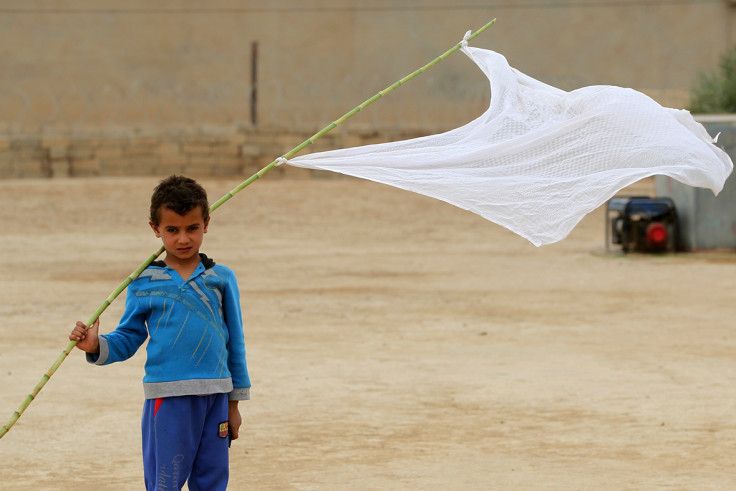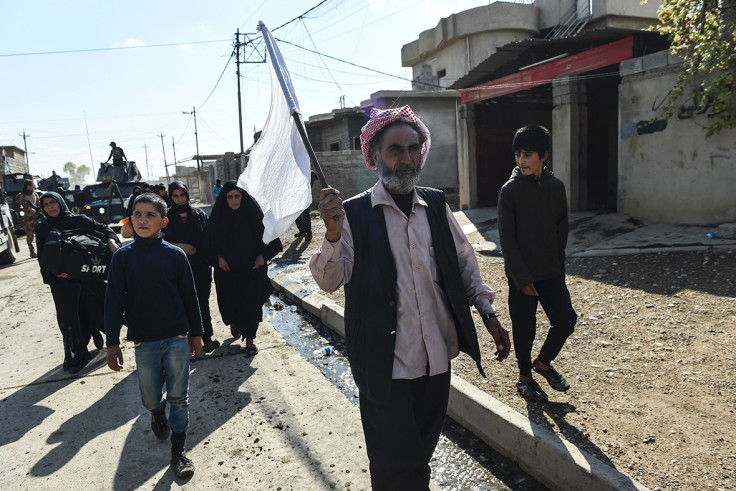UN reveals Islamic State hanged 40 people in Mosul and used chemical weapons
UN urged Iraqi government to restore rule of law as soon as possible to prevent revenge attacks.
The list of atrocities attributable to the Islamic State (Isis) against the population of Mosul continues to grow. Not even a week after the gruesome discovery of a mass grave containing the remains of around 100 beheaded bodies inside a school near Mosul, the United Nations disclosed new reports of human rights abuse.
The barbaric crimes include the killing of 40 civilians in Mosul who were accused of collaborating with the Iraqi Security Forces (ISF). Their bodies, dressed in orange clothing marked in red with the words "traitors and agents of the ISF," were hung on electrical poles in several areas in Mosul.
The UN High Commissioner for Human Rights Zeid Ra'ad Al Hussein, who wrote about the reports in a news release on Friday (11 November), also confirmed reports that boys, some as young as 12, are recruited as "sons of the caliphate" and deployed in the alleys of the old town of Mosul wearing explosive vests.
In a video Isis posted on 9 November, four children believed to be between 10 and 14 years old are shown shooting to death four people accused of spying for the ISF and the Kurdish Peshmerga forces, the lifeless bodies falling into a river nearby.
Women have also been particularly subjected to violence and sexual exploitation. According to the UN, Isis fighters have been relocating abducted women, including Yazidi women, into the towns of Mosul and Tel Afar, since 27 October. "Some of these women were reportedly 'distributed' to ISIL fighters, while others have been told they will be used to accompany ISIL convoys," the UN reported.
On Monday 7 November, almost 1,000 people were found by the ISF in an underground prison in the Shura sub-district of Mosul. Many of the 961 Sunni Muslims found in the prison were former ISF officers or members of the Iraqi Islamic Party, and bore signs of torture and malnutrition.

According to the UN, the IS regime has threatened to execute any of its fighters who try to flee, and it has already beheaded seven of its militants for deserting the battlefield in the Kokjali area of eastern Mosul.
The UN official also mentioned Isis's use of chemical weapons, citing four people who died on 23 October after inhaling fumes from burning sulphur from al-Mishrag sulphur gas factory and field in the Shura sub-district of Mosul.
These new reports add to the many instances of human rights abuses committed by the extremists, including the use of civilians as human shields and arbitrary killings.

The UN has called for immediate action from the Iraqi government to restore the rule of law and step up law enforcement in the areas liberated from Isis in the Mosul offensive, to ensure that captured fighters and their perceived supporters are brought to justice, limiting opportunity for revenge attacks and collective punishment.
Thinking about the post-Isis future of Iraq, Zeid urged the government to support the formal justice process with actions that promote community reconciliation, such as truth-telling and restorative justice, and the provision of medical and psycho-social services, such as housing, education and other financial support that may assist people in rebuilding their lives and their communities.
"The people of Iraq – all the people of Iraq – must see that their state, by its actions, is capable of protecting them by bringing to justice those guilty of the horrible crimes that have been committed against them," Zeid said. "Failure to do so may seriously jeopardise the long-term peace and security that the people of Iraq deserve."
© Copyright IBTimes 2025. All rights reserved.






















